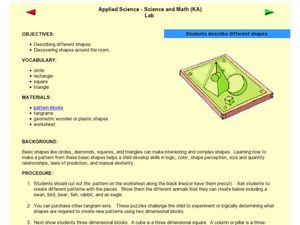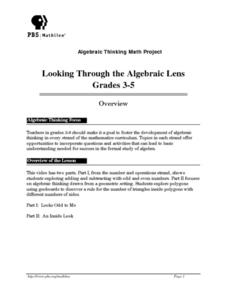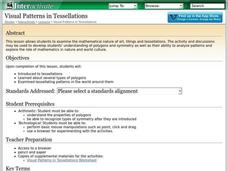Utah Education Network (UEN)
Geo Shapes
Invite your first graders to compose and decompose two and three-dimensional figures with this fun, hands-on lesson. They investigate and predict the results of putting together and taking apart two-dimensional shapes with rubber bands...
Curated OER
Polyhedra: Faces, Edges, and Vertices (3-D Marshmallow Models)
Third graders explore the attributes of 3-dimensional shapes. In this shapes instructional activity, 3rd graders examine faces, edges, and vertices of 3-dimensional shapes as they construct shapes using marshmallows and toothpicks.
Curated OER
Applied Science - Science and Math (K) Lab
In this shape instructional activity, learners cut out tangram shapes and create different pictures with them. They look at 3-D shapes as well. There is a nice, hands-on component built into this instructional activity.
Annenberg Foundation
Geometry 3D Shapes: Euler's Theorem
How do you get a theorem named after you? Euler knows what it takes! The third lesson of five asks pupils to use an interactive activity to compare the faces, vertices, and edges of seven different three-dimensional solids. They use...
Curated OER
Compare 2-D Shapes
Second graders explore and analyze plane shapes. For this plane shapes lesson, 2nd graders evaluate shape attributes to classify shapes correctly. Students work in groups to create different shapes.
Curated OER
Grade 3: What Can I Make with 30 Centimeters?
Third graders create polygons with perimeters of 30 centimeters, use the centimeter grid paper to determine the area of each shape, and organize the shapes to make generalizations from the patterns they see.
Curated OER
Looking Through the Algebraic Lens
Students work with rectangles to find generalizations for adding and subtracting odd and even numbers in part one of the lesson. In part two, students use geoboards to construct polygons, look for patterns, and find a general rule.
Curated OER
Soft Sculpture Birds
Art can mimic life, and animals are always interesting subjects. Learners create large soft sculptures (stuffed) birds using paper, paint, and other basic collage materials. They view images of birds, and discuss bird traits and shapes....
Curated OER
Shape Hunt
Young scholars explore two-dimensional and solid shapes. In this shapes and patterns geometry lesson, students work with a partner to create identifiable objects using tangrams. Young scholars describe the attributes of their shape and...
Curated OER
Repeating Patterns
Students explore growth patterns by using manipulatives such as pattern blocks, investigate growth pattern of pattern, record growth in T-chart, describe how pattern is growing, and predict number of blocks needed to extend pattern.
Curated OER
Poly-Mania
This hands-on activity takes young geometers on a tour of 2D polygons and 3D polyhedrons. After exploring different web resources and discussing geometric shapes, small groups construct models of polyhedrons using bendable straws. Note:...
Shodor Education Foundation
Visual Patterns in Tessellations
Geometers explore the concept of tessellations. They use a tessellation applet to manipulate shapes and design their own tessellation using the applet.
Noyce Foundation
Piece it Together
Score some problems all related to soccer balls. The first few problems focus on pattern blocks to see relationships between figures. More advanced problems focus on actual soccer balls, the patterns on the balls, and their volumes and...
Curated OER
Exploring Tessellations
Fifth graders examine how to make tessellations. In this tessellation activity, 5th graders review the meaning of the word "polygon" while the teacher shows them various examples. They practice making tiling patterns or tessellation's...
Curated OER
Terrific Tangrams
Third graders construct tangrams. In this tangrams lesson, 3rd graders manipulate basic shapes to construct tangrams. Students explore how shapes can be combined in different ways and develop spatial sense.
Curated OER
Introducing Powers and Models
Young scholars construct two dimensional models to illustrate squared numbers. In this geometry lesson, students use graph paper and an x/y axis to build squares exponentially. Young scholars identify powers and relationships between...
Curated OER
Matters of Milk and Marshmallows
Students observe a teacher demonstration o classifying matter by its physical properties of shape and size. After discussing the definition of matter, students describe the state of matter. They sing a song to the tune of "Bingo." In...
Curated OER
Arts Impact and Math
Third graders incorporate math into dancing. In this algebra lesson, 3rd graders identify different shapes and patterns using dance movements. They relate the different creations to polygons as they incorporate the use of stretchy bands...
Curated OER
Tessellations: Geometry and Symmetry
Young scholars explore the concept of tessellations. In this tessellations lesson, students use an applet to construct tessellations. Young scholars use regular polygons to construct tessellations. Students find patterns and symmetry in...
Curated OER
Problem Solving Using Power Polygons
Students investigate geometric shapes by creating figures on a plane. In this polygon lesson, students complete a worksheet based on the angles in a power polygon. Students identify the different types of polygons and define their...
Curated OER
Falling Into Geometry Through Paper Art
Students explore geometric shapes. In this kindergarten geometry lesson, students create a fall quilt consisting of three different paper geometric quilt squares that when assembled form a scarecrow, a pumpkin, and a crow. ...
Curated OER
Does Your Field Measure Up
Students measure angles using a plane table kit. In this geometry lesson plan, students use trigonometric identities to find the values of the length of a football field.
Bowland
DanceStar
Express dance moves mathematically. Scholars dissect dance routines and express them using mathematical notation, such as translations and rotations. They use video clips to investigate seven different dance genres.
Curated OER
Mirror Wells
Learners study mirror wells, which are similar to 3-D kalediscopes, but the end is cut off to enable you to look at patterns through them.























